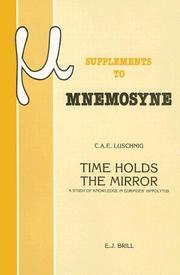| Listing 1 - 2 of 2 |
Sort by
|
Multi
ISBN: 9783110468618 3110468611 3110471396 3110470675 9783110471397 9783110470673 Year: 2016 Volume: Band 19 Publisher: De Gruyter
Abstract | Keywords | Export | Availability | Bookmark
 Loading...
Loading...Choose an application
- Reference Manager
- EndNote
- RefWorks (Direct export to RefWorks)
This edition contains the Greek text of the scholia (vetera and recentiora) and the glosses to Euripides' Hippolytus with a critical apparatus and an apparatus of loci similes. Before the text comes an introduction consisting of two chapters: the former sketches out the history of the exegesis and critical interpretation of the Euripidean text in antiquity as well as the creation and development of this scholiastic corpus, while the other investigates more accurately the manuscripts and the medieval and Renaissance tradition of the scholia to the tragedy. At the end I added the edition of the Triclinian scholia to Hippolytus from Laur. 32.2 together with a metrical apparatus of the choral sections and then a Humanistic paraphrasis, which can be found in Mon. Gr. 258. The purpose of this work is to improve Schwartz's edition both in recensio and constitution of the text. About what concerns the recensio, this was extended to sixteen manuscripts instead of the four used by Schwartz. The reassessment involved not only the more recent manuscripts but also some witnesses dating to the Palaeologan age, disregarded or only partially collated by the former editor.
Euripides. --- Euripides --- Hippolytus (Euripides) --- Euripide --- Scholia. --- Criticism --- Philology --- Ėvripid --- Yūrībīdīs --- Euripedes --- Eŭripido --- Eurypides --- Euripidesu --- אוריפידס --- エウリーピデース --- Εὐριπίδης --- Hippolytos (Euripides) --- Euripidou Hippolytos (Euripides) --- Crowned Hippolytus (Euripides) --- Hippolytos stephanēphoros (Euripides) --- Hippolytus. --- Triclinius.

ISBN: 9004086013 9004328939 9789004086012 Year: 1988 Volume: 102 Publisher: Leiden
Abstract | Keywords | Export | Availability | Bookmark
 Loading...
Loading...Choose an application
- Reference Manager
- EndNote
- RefWorks (Direct export to RefWorks)
The work is limited to the question of knowledge in Euripides' Hippolytus and seeks to show that one of the major themes of the Hippolytus , as of the Oedipus , is knowledge. In successive chapters these subjects are treated: (1) the witness theme, seeing and knowing, what the senses reveal; (2) fantasies of other worlds created by the characters and how these fantasies reavel the character's perceptions of the world; (3) how Euripides causes his characters to become aware of the shifting meanings of words and how it happens that one statement and its opposite can be predicated of the same individual or act; (4) the desire for and fear of knowledge and the choice of ignorance; (5) the use of generalization as a kind of ignorance; (6) the relation of the character's knowledge to that of the audience. The work offers a new perception of the drama through a detailed examination of this important question that was so warmly debated among the early Sophists.
Drama --- Euripides --- Greek drama (Tragedy) --- Hippolytus (Greek mythology) in literature --- Knowledge, Theory of, in literature --- Tragédie grecque --- Hippolyte (Mythologie grecque) dans la littérature --- Théorie de la connaissance en littérature --- History and criticism --- Histoire et critique --- Euripides. --- Hippolytus (Greek mythology) in literature. --- Knowledge, Theory of, in literature. --- 875 EURIPIDES --- Griekse literatuur--EURIPIDES --- 875 EURIPIDES Griekse literatuur--EURIPIDES --- Euripide --- Tragédie grecque --- Hippolyte (Mythologie grecque) dans la littérature --- Théorie de la connaissance en littérature --- Kennisleer / in de letterkunde. --- Euripide. Hippolyte. --- Connaissance (Théorie de la) / dans la littérature. --- Euripides. Hyppolytus. --- Literature. --- Belles-lettres --- Western literature (Western countries) --- World literature --- Philology --- Authors --- Authorship --- Hippolytus --- Hipòlit --- Hipolitas --- Hipólito --- Hippolütosz --- Hippolyte --- Hippolytos --- Ippolito --- Ippolitu --- Hippolytus (Euripides) --- Hippolytos (Euripides) --- Euripidou Hippolytos (Euripides) --- Crowned Hippolytus (Euripides) --- Hippolytos stephanēphoros (Euripides)
| Listing 1 - 2 of 2 |
Sort by
|

 Search
Search Feedback
Feedback About UniCat
About UniCat  Help
Help News
News